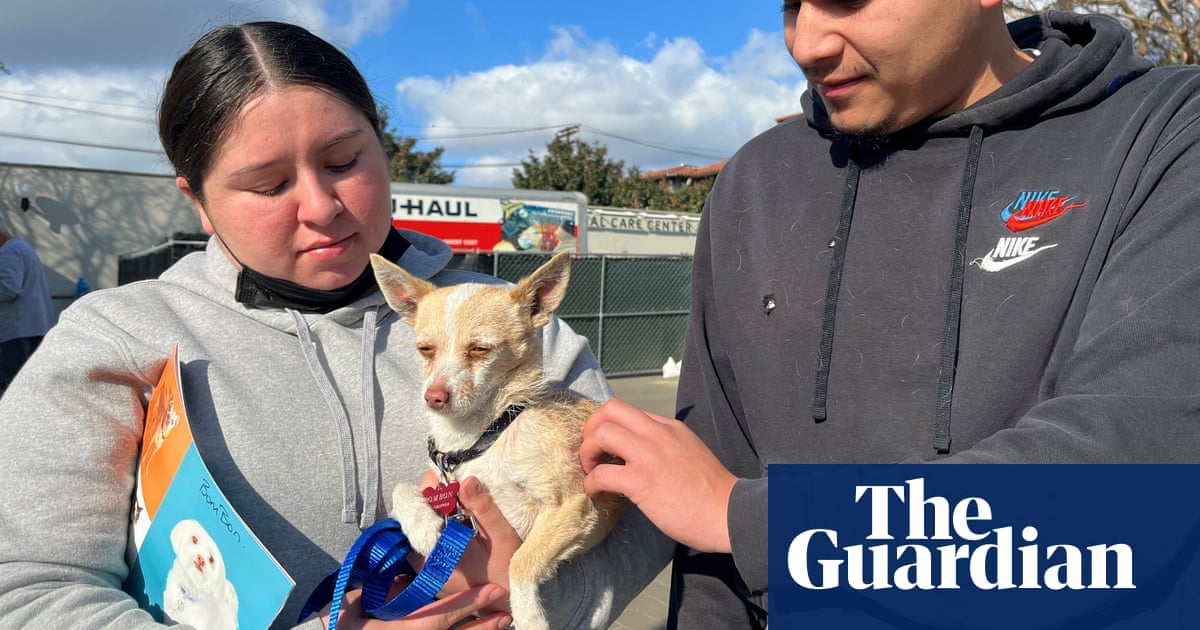As the wildfires besieged Los Angeles, marauding through hillside suburbs at an impossibly fast and ferocious pace, 500 miles away Garrett Needles and the volunteers with the North Valley Animal Disaster Group started making plans.
The northern California-based group specializes in helping evacuate, rescue and shelter animals during catastrophes, and has responded to some of the state’s largest and most devastating wildfires. Needles, the non-profit’s executive director, who had recently retired as an assistant chief after 30 years working for the California department of forestry and fire protection (Cal Fire), had a feeling their expertise would be needed.
“They hadn’t experienced something like this and, of course, us going through our large fires … unfortunately we happen to be more experienced,” Needles said.
The fires in Los Angeles have destroyed more than 10,000 homes and killed at least 27 people, becoming some of the worst in California history. Those who work with animals know that when flames tear through communities, sending families fleeing and leveling neighborhoods, they create a disaster for an untold number of animals.
Within the fire zones are pets and livestock, many left behind by owners unable to reach them or evacuate them in time, as well as injured wildlife. As firefighters and emergency workers race to respond to disasters, local shelters and animal non-profits also spring into action to board pets, treat those with burns or smoke injuries and find those trapped in burn areas.
As the Eaton fire was burning through Altadena, hundreds of animals were sent to the Pasadena Humane Society, which serves as an emergency boarding center for disasters in the region.
Owners brought their cats, dogs and other animals to the 122-year-old non-profit as they sought refuge. For a time the facility was housing peacocks, a giant tortoise and even a pony, whose owner walked it at least seven miles from burning Altadena to the doors of the humane society, where it stayed overnight.
Days after the fires began, the American Society for the Prevention of Cruelty to Animals (ASPCA) sought assistance on behalf of the humane society from the specially trained volunteers with the North Valley Animal Disaster Group, who took time off from their day jobs as realtors and welders to aid in the response. After some bureaucratic hurdles, they were deployed with animal control officers to go through the burn area of the Eaton fire, where teams fed animals and rescued those found by first responders.
Among the 1,600 animals the team helped care for over the course of a week were koi fish, which are particularly difficult to evacuate, and a cat suffering from burns and smoke inhalation. Finding and saving animals was a boost to the volunteers in the fire-devastated region, Needles said.
While groups mobilize on the ground to aid in the response, other non-profits have worked to clear shelter space to accommodate the surge in animals from the fires. The Best Friends Animal Society, a non-profit with an LA office, said its staff quickly got to work with the Pasadena Humane Society as well as the local shelters to help find placement for animals who were there before the fires began. They have helped organize flights to transport hundreds of animals to rescues and foster homes in Utah and Idaho, and in the past two weeks have assisted nearly 1,000 animals.
Meanwhile, more than 1,000 people in Los Angeles have volunteered to foster animals – an almost unprecedented number in that amount of time, said Julie Castle, the organization’s chief executive.
“To have this happen overnight was stunning to us,” Castle said. “I’ve been working in this field for 28 years now and I haven’t seen anything like this. The closest that comes to it is Katrina.”
“It’s been a really sad and heartbreaking time but at the same time it really does bring the best out in humanity.”
Firefighters have managed to gain a hold on the fires that have devastated Los Angeles in recent weeks and residents are beginning to return to what’s left of their communities. All around Altadena, in front of the charred rubble of homes and blackened grocery stores and near signs proclaiming the neighborhood will rebuild, are posters for missing animals. One poster features the photos of two cats: a large Maine coon, Merlyn, and a petite black and orange feline called Kiki.
The Pasadena Humane Society is hoping to reunite residents with their lost animals. The non-profit has been housing nearly 500 animals, including dogs, cats, rabbits and reptiles. Some were temporary guests until their owners found more stable housing while more than 250 are strays or have not yet been linked to their owners.
The humane society has been in emergency mode since the fire began, housing pets whose owners have been displaced and working with teams searching for animals still in the fire zone. It had suspended all of its normal operations in the aftermath of the blaze, including adoptions and puppy training classes.
With the hundreds of animals staying at the facility, the non-profit last week looked like some version of Noah’s ark. There were animals in kennels and dedicated cat rooms, as well as offices that were quickly repurposed. From behind blinds, a lanky orange and white cat peered at passersby.
At least 200 animals were reunited with their families by last week, said Kevin McManus, a spokesperson for the humane society, over the sound of many barking dogs. (On Thursday, the humane society reported it had reunited more than 1,000 pets). One of those animals, a cat named Carrot Cake who was dehydrated with burned paws, was quickly reunited with their owner thanks to his microchip. “I knew he was a fighter,” his owner said in a video shared by the society. “But I just can’t believe he’s here. I never thought I’d see him again.”
The facility plans to house all displaced animals for as long as their owners need, McManus said. One family has come to the shelter daily to bring their dog his preferred meal of boiled chicken, he added.
The non-profit has been aided by massive community support in the form of donations and volunteers. People have brought so much food, litter and animal supplies that the humane society has had to find warehouse space and use several U-Haul trucks to store it all.
“It’s been so uplifting, especially for staff who are here and volunteers who are here, like doing the intakes of the animals and seeing people in their most desperate need,” McManus said.
With southern California continuing to face the threat of fires amid dry and windy weather, the work hasn’t slowed for animal groups. On Wednesday, a huge fire ignited in the rugged mountains north of Los Angeles, quickly burning thousands of acres and forcing the evacuation of thousands of people and at least one animal rescue. Workers with the Best Friends Animal Society swung into action once again, helping to relocate 60 animals, including horses, chickens and goats.








